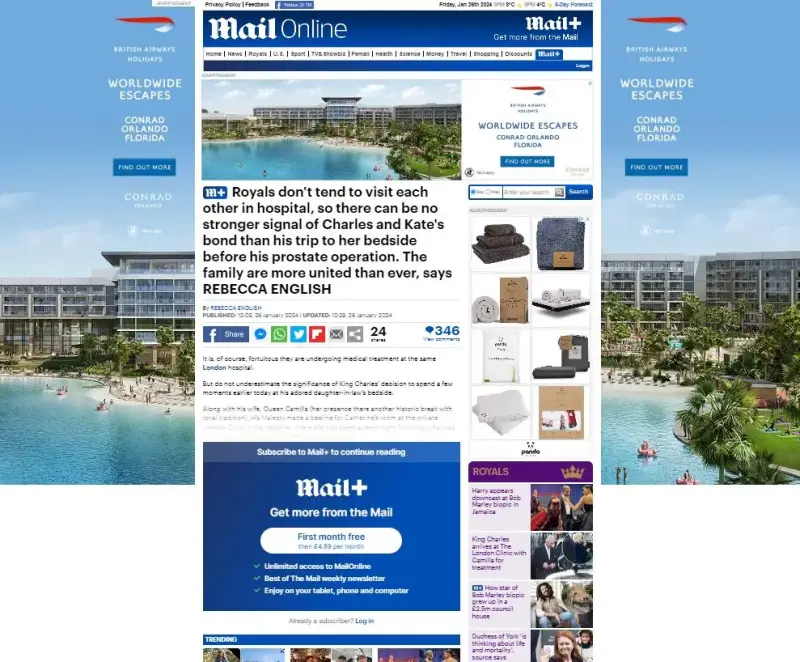
Mail Online is building on a “great position of strength” from its “huge, loyal, engaged, direct audience” with the launch of a partial paywall, according to its editor/publisher Danny Groom.
Groom told Press Gazette that Mail Online’s strong direct readership makes it “the envy of the publishing world” and presented an opportunity to deepen relationships with those people.
He said: “It’s a tough time in the industry, of course, but I think people here recognise that being able to invest and to launch new products and to diversify is our way of future-proofing.”
On Tuesday (23 January) Mail Online began rolling out its new Mail+ subscription service to all UK users, who can sign up to get up to 15 premium articles per day plus a curated “Best of The Mail” weekly newsletter for £4.99 per month.
The Daily Mail’s app, formerly called Mail+, was previously the home of premium content and is now called Mail+ Editions offering readers a digital version of the print edition and puzzles for £12.99 per month.
The content going behind the paywall will focus on some of the Mail’s core content areas including the royal family, special investigations, health, personal finance and columnists. Articles are marked with a Mail+ logo if they are part of the paid offering and on those pages users see the logo as part of the masthead.
Mail+ articles shown to Press Gazette on Friday afternoon included:
- “How star of Bob Marley biopic grew up in a £2.5m council house“
- Mail critics giving advice about the top 20 shows to watch on Netflix
- an investigation into whether buying is really still cheaper than renting for first-timers
- an interview with Lorraine Kelly about class diversity
- and a column by royal editor Rebecca English.
Groom, who was appointed editor and publisher of Mail Online in the UK in August 2022, told Press Gazette the paywalled content will be “high-quality content, which you may not have seen previously on Mail Online, or you may have seen some of it, but you want to see more of it”.
Thomas Lowe, director of digital reader revenue, added: “We’re confident that we can create content that people will pay for. And that has allowed us to launch something that I would argue is probably slightly more prominent than you see from other brands that are exploring paid-for models.
“So I think that is also what sets us apart – this plays an integral role in the Mail Online ecosystem. It’s not just a bolt-on that you often see…”

Mail+ partial paywall shows ‘investment in growth’
Groom said the paywall launch showed the “investment in growth” from proprietor Lord Rothermere, who took the company private in December 2021 to free it from “the capricious short-termism of the City” and enable better long-term investment.
“The main focus of all of this, of all the evolution, of all the diversified products, the content, is investment,” Groom said. “It’s investment in growth. And yes, these are difficult times for the industry, but we’re extraordinarily lucky here to have a proprietor who is passionate about investing in journalism.”
Press Gazette understands that Mail Online’s newsroom is 25% bigger than pre-Covid, although the exact number of journalists is not public. In recent years the Mail’s print and digital teams have begun working much more closely together in an integrated newsroom. Moves to merge the print and online teams have seen dozens of senior journalists leave the business over the past year.
Press Gazette analysis suggests Mail Online is the most prolific original news outlet in the UK, producing around 1,500 stories per day.
Groom added: “Everything that we do, the focus of that is to try to invest more in quality journalism, because ultimately we’re very confident and proud of the products that we produce and we know that readers love them. And so it makes sense that we are aiming to reinvest in quality journalism so we can provide more content and create better products.”
Mail Online in ‘really good position’ despite tough times
Groom said that the website’s “scale and quality” alongside its “huge direct audience” built up over the past decade have put it in a “really good position” in the face of widespread industry challenges like falling Google and Facebook referral traffic due to algorithm changes as well as the threat posed by Google’s AI-generated search results. Most publishers have reported declining ad revenue and loss of market share to tech platforms over the past year, leading some to fear for the future of ad-funded journalism on the open web.
According to Similarweb, almost half (48%) of traffic to dailymail.co.uk between October and December was direct, versus 34% from search and 12% from social.
For comparison, at thesun.co.uk 35% was direct, 47% was from search and 14% was from social, while mirror.co.uk received 31% of its traffic directly with 50% from search and 14% from social.
According to Similarweb, Mail Online was the sixth biggest English language news website in the world in December with 376 million visits (down 13% year on year).
Ipsos iris, the official data provider chosen by leading UK newsbrands, puts Mail Online as the third biggest UK newsbrand behind the BBC and The Sun – although it was well ahead of its commercial rivals on engagement with 1.5 billion UK audience minutes in November.
Groom said: “I think some of our rivals who have based their business model on slightly different ways of working are obviously now suffering, but we’re in a very good position in that we have a huge, loyal, direct audience.
“But at the same time, obviously addressing the issues of social media and what’s happening with Google and what’s happening with Facebook et cetera, that is important to us.
“We’ve invested a lot of time and resources and new people coming in over the past couple of years to focus specifically on that. And I think we’d be silly to ignore that, because it’s certainly an important part of our business. But I think we’re in a much stronger position than many of our rivals.”
But Groom said it would be “completely wrong” to suggest that the addition of a partial paywall on Mail Online means its free-to-read advertising model has broken.
“We are trying to create an additional layer of content and we’re trying to provide more for our engaged readers, as well as hopefully find some new readers as well,” he said. “But obviously, we’re not going to lose sight of the huge free-to-air audience that we have. They can coexist and hopefully they can grow together side by side.”
‘Simple and competitive’ pricing chosen
The Mail team went on trips to learn from two European publishers with a similar type of online subscription model.
Switzerland’s Blick launched a Blick+ digital subscription last year giving users more than 200 additional articles per month for 9.90 CHF (£9). In Germany, Axel Springer’s Bild has a BILDplus digital offering which first launched in 2013 and now has more than 680,000 paying subscribers and an offer of €8.99 (£7.70) per month that includes Amazon Prime.
Lowe said two decisions about the £4.99-per-month pricing of Mail+ were made early on: it had to be “simple and competitive” and it had to have just one price for everyone, avoiding the “quite complex pricing systems” at some other publishers.
“We think the price point we’ve gone for provides incredible value,” Lowe said. “Our approach has been long-term growth. This is not a short-term, make-money project. This is about growing a sustainable product that will set us up for the next 50-100 years.”
The decision to include 15 paid-for articles a day, Groom said, came because they “wanted to proceed with caution. But at the same time, we wanted to feel like it was additive and that people were getting value for money.”
Mail+ was previously the brand name for a product that launched in 2013 as an iPad product and later evolved to add extra interactive, video and podcast content. It is now called Mail+ Editions and has more than 150,000 subscribers – with, according to Lowe, “incredibly high” engagement and most subscribers reading front to back and playing its puzzles.
According to ABC Mail+ has 156,000 subscribers and averages 87,000 daily views (the digital edition is included as a free extra for print subscribers).
Groom said: “The previous incarnations of Mail+ have been incredibly successful but obviously what we’re trying to do here is to lock into the huge free-to-air audience that we have.
“In terms of the branding, we liked the name and it very much does what it says on the tin, which is to provide readers with more of the Mail, essentially. That’s the main ethos behind it.”
Mail Online’s extensive range of exclusive video content, which previously lived on the Mail+ app, is now hosted on the Daily Mail Youtube channel (which has 3.2 million subscribers). Mail podcasts are available for free on various platforms.
‘We’re an ambitious company’
Lowe, who is spearheading the Mail+ project, joined the publisher 18 months ago after eight years at The Times where he worked his way up to be director of subscriptions. The Times has found profit and success with a hard paywall that launched ahead of most of its competitors in 2010.
Lowe said despite the Mail having a very different model “it’s a very similar concept in creating content that people are willing to pay for”.
He added: “I think I’ve been able to bring the experience of how you track how people are paying, how to grow subscriptions, et cetera, that complements the scale that these guys clearly already had.”
Although Mail Online’s revenue mix is currently dominated by advertising, Lowe suggested subscriptions could become an important part of the pie.
“I don’t think we can predict what’s going to happen,” he said. “We’re committed to providing a great experience for free and paying readers. But we’re ambitious, we’re an ambitious company, and we want to get some some good numbers on our subscription performance… both are our priority.”
Email pged@pressgazette.co.uk to point out mistakes, provide story tips or send in a letter for publication on our "Letters Page" blog
